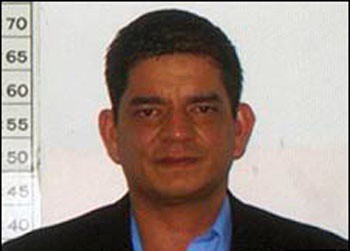Miami Terror Machine: Who Is Francisco Chávez Abarca?
by Llewellyn Hinkes-Jones

According to this convoluted Miami Herald article that macerates its own opening, the recently arrested Francisco Chávez Abarca, who is accused of terrorist attacks in Cuba in the 90s, is actually a double-agent mystery man in a thriller of international suspense and intrigue. He admits to planting bombs in hotels and colluding with others on the bombing of Cubana Flight 455, but maybe he’s just a patsy in a game of cloak and dagger and disinformation to tarnish the good name of admitted terrorist Posada Carriles?
Actually, no, none of that makes any sense. Some back-story might be helpful.
Although most Americans don’t know it, Cuba’s actually been inundated with terrorist attacks in the 50+ years following the Cuban revolution. Everybody knows about the Bay of Pigs Invasion, but there’s been many others that most people don’t know about: hotel bombings, agricultural sabotage, attacks on Cuban diplomats, and the downing of a commercial flight headed to Barbados killing all 73 passengers aboard — including the whole Cuban fencing team. Most of it was perpetrated by Cuban ex-pats living in Florida.
There’s a lot of speculation about how much of it is CIA financed or planned, and for that you really need to dig into details and paper trails. For many years, Miami was home to the CIA’s second-largest base of operations. But the people who orchestrated the attacks — everybody knows who they are. They freely admit their role in the attacks. They consider it retaliation for the “crimes of the Revolution.” Or something like that. They hate Fidel with a passion, either because he took, or was about to take, their land, wealth, casinos and/or rum factories and spread it amongst the people. Fidel also had a tendency to throw people in jail at the drop of a hat. That certainly didn’t help the situation.
Still, the result is that there are literally terrorist training camps in South Florida, as crazy as that seems. These are terrorist training facilities, as in “training facilities for attacks on civilians.” Orlando Bosch, who is implicated in the Cubana Flight 455 bombing and lives freely in the U.S., has previously stated that all Cuban planes, commercial or otherwise, are available for attack.
This would all be shocking information for anybody caught up in the American idea of a war on terror, but really, nobody in America cares, except for people in Miami and in certain parts of New Jersey. It’s all a battle between Cuba and ex-Cubans. Some of it just happens to be planned out on American soil.
One of those terrorists is Luis “Bambi” Posada Carilles. Posada, who also lives freely in Miami, admits to helping bomb a series of Havana hotels in the late 90s (bombings that injured 11 people and killed an Italian tourist), to running guns to the Nicaraguan rebels for Oliver North and the CIA, and to attempting to assassinate Castro with a gym bag full of C4 in Panama. But he denies having anything to do with the flight bombing. That would just be crazy.
So when Venezuela arrests an accused terrorist and car thief named Francisco Chávez Abarca, and he implicates Posada in the flight bombing, the obvious conclusion that the Miami Herald jumps to is that all of this is fake. It’s all diplomatic theater. Rather than an admitted terrorist being guilty of other crimes of terrorism, it’s really that these other countries have hired actors to falsify confessions. They gave him a script to read with all the intimate details of planting a bomb in a Havana hotel in the 70s, set him up in front of a video camera and let him chew some scenery.
The Herald doesn’t really get into why they would think Abarca is a double agent of mystery. They quote Posada’s attorney, who thinks Abarca should look more gaunt from his time in prison — and meanwhile, Abarca’s wife freely admits to his role in the attacks. “’You have to remember the role Cuba played in El Salvador: they trained guerrillas in explosives and bombs,’ she said in a telephone call from El Salvador. ‘So what is the issue: who planted more bombs?’”
That’s the odd situation that the Herald is in. Because their bread and butter is the ex-pat community in South Florida, they can’t just print any accusation that comes out of Cuba or Venezuela. And they certainly can’t admit that we’re harboring a wanton international terrorist in the heart of War on Terror-land. So they threw together something confusing about mystery and spies and subterfuge in the hopes that afterwards nobody would remember what all the fuss was about.
Llewellyn Hinkes-Jones is a Washington, D.C.-based writer whose work has appeared in The Toronto Star, The Atlantic and The Morning News.
